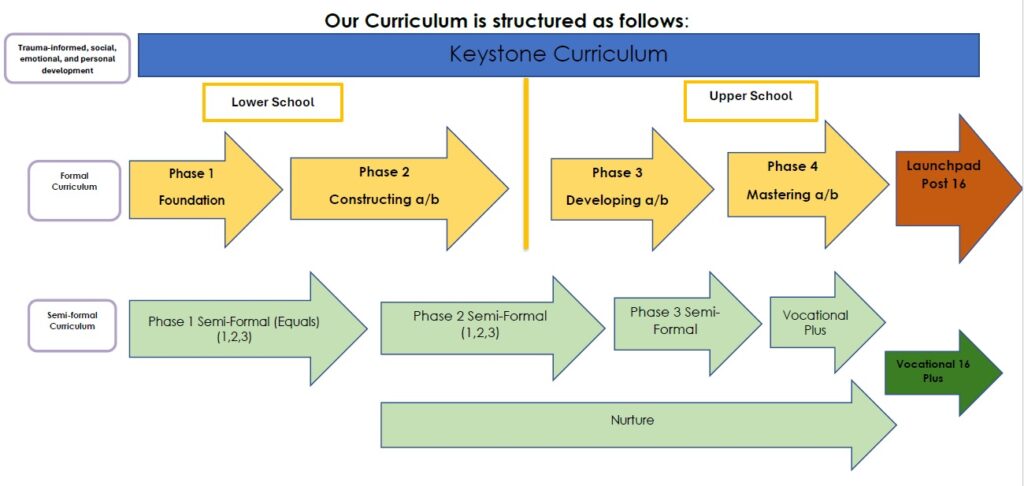Principles and Purpose
The overall aim our curriculum is to enable all pupils at Westbourne School to thrive by developing self-belief and pride; becoming successful learners, confident individuals, and responsible citizens.
The word ‘curriculum’ should be interpreted to include all learning experiences pupils have in school, but also within all the other activities that we organise in order to support social development, personal growth and therapeutic engagement.
Our curriculum is sequenced to develop skills and knowledge to deepen understanding; but also allows for appropriate input to fill gaps and build solid foundations, which is appropriate for many of our pupils.
Our curriculum is delivered by skilled, empathetic, and knowledgeable staff in a nurturing, trauma-responsive environment; and our aim is always to provide learning opportunities that inspire curiosity, are rewarding and engaging, are ambitious and adaptive to everyone’s learning needs.
Our core principals:
- Embed everything we do from the view of Unconditional Positive Regard for our learners (TIP framework), within our AAD (Ask, Accept, Develop) and Nurture
- Maintain a consistent focus on the overall purposes of the curriculum – we must all have a focus on why we do what we do and not just how.
- Focus on the core skills of Reading, Vocabulary, Numeracy and Oracy.
- Maintain a focus on the research and science behind what we are offering (embrace “learn what, learn how”)
- Challenge all learners by encouraging them to recognise the importance of sustained effort in meeting expectations that are high but achievable for them.
- Create authentic contexts for learning that foster curiosity and engagement
- Support social and emotional development and positive relationships
Westbourne School – Curriculum Statement:
At Westbourne School we believe that all our pupils have the right to access an ambitious and appropriately challenging curriculum, which connects them both to their own lived community and cultural experience but also widens their horizons to the wider world around them.
The majority of our learners have a neurodivergent diagnosis (often of Autism and/or ADHD) and/or a Social, Emotional or Mental Health (SEMH) need. Some children or young people have experienced early childhood or ongoing trauma and as a result we have an established trauma-informed culture with trained staffed throughout our school community.
Our curriculum has two pathways, alongside a short-term ‘keystone curriculum’ provision for pupils in crisis or who are not able to access our mainstream pathways for a variety of reasons. Learners provision is then further personalised to reflect their individual learning and developmental characteristics, as well as being consistent with the overarching requirements of their Education, Health and Care Plans (EHCP). Westbourne also has nurture provision available for all our phases.
We offer pupils the chance to obtain GCSEs, BTECs, ASDAN certificates, and Functional Skills qualifications, as well as access to a DofE curriculum in their outdoor education provision.
Enhanced Offer:
We have a skilled, trained Pastoral and Wellbeing Team on both our school sites who offer individual intervention sessions as well as immediate crisis support. We also have an on-site clinical team who offer support to pupils in universal, enhanced or specialist provision (referrals are made via a termly MDT meeting)
Literacy and Reading
Phonics is delivered through Phonics International’s ‘No Nonsense Phonics’ Programme. Upper and Lower School staff have received phonics training. More training is scheduled for staff who have just started. Phonics is taught daily in lower school, with fidelity to the scheme that is used. Phonics is delivered as an intervention for upper school pupils who are identified as requiring this through a screening assessment.
All pupils complete a Star Reading assessment. This supports appropriate groupings and adapting teaching appropriately. Pupils whose Star Reading assessment identifies a reading age 18 months below their chronological age complete a phonic screening assessment.
Reading is further supported through:
- Reading in tutor time
- Key words in planning and on displays
- Word of the Week activities
- World book day activities
- Staff ‘I am Reading posters’
- Additional support for pupils with significant areas of challenge comes in the form of , targeted interventions – 1:1 support, catch-up and phonics, comprehension, and specialist speech and language interventions with our clinical team.
Numeracy Intervention:
All pupils complete a Star Maths assessment. This supports appropriate groupings and adapting teaching appropriately. Numeracy intervention is offered by our interventions team, and can include targeted support in specific areas of need, general catch up, or focus on specific EHCP targets around lifeskills numeracy work (for example money, time etc)
Therapeutic Intervention:
The Clinical Team work within Outcome First Group’s Wellbeing Rainbow where support for students is at the 3 different tiers:
- Universal- Where the clinical team supports the whole school therapeutic environment and offer staff training on areas of particular need.
- Enhanced- The clinical team promote multidisciplinary involvement in supporting pupils, this may mean the pupil has specific strategies recommended to teaching staff to support them to engage and learn in the classroom or they are involved in group therapy sessions.
- Specialist- The pupil is invited to 1:1 therapy sessions with a member of the clinical team.
The clinical team operates on a referral system for specialist level support, this is based on the pupils EHCP recommendations and teacher/parental concerns.
The clinical team are based on site and therefore are easily accessible to staff and pupils.
Westbourne Pathway Map
